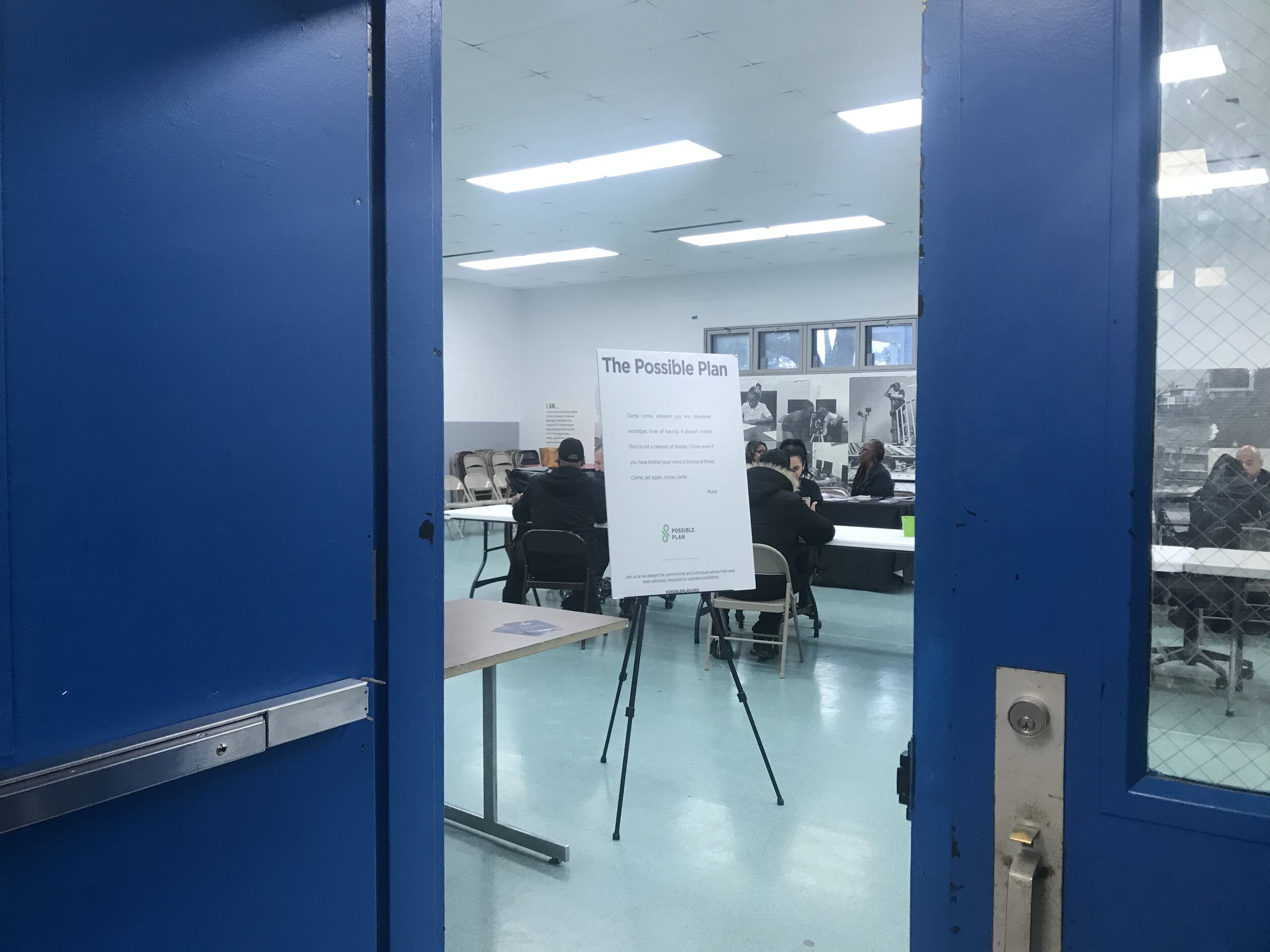Traffic stop, traffic stop, traffic stop—most of the people The Outlaw Report spoke to at an expungement clinic in West Baltimore last week explained how their weed charge began when they were pulled over by police and often, for something other than weed—broken tail light, speeding, no seatbelt, even “fit a description.”
“K” is one of about 30 people waiting to see a lawyer and like most people in this story, he will remain anonymous (it does not make much sense to publish people’s full names in an article about expungement if they are here to get their names expungement from court records).
“I got pulled over. They said they smelled weed—they didn’t smell no weed—searched the car and found like, a few teensy crumbs,” K said. “This was years before weed was ‘medical,’ you know what I’m saying?”
When K says “medical” he put his fingers in air quotes and rolls his eyes. You can understand why K is cynical about burgeoning cannabis business nationwide when charges for the very same drug still sit on his record and continue to jam him up. That’s the reason why Jason White, the Chief Marketing Officer for the Select cannabis brand helped host this expungement clinic in the Baltimore neighborhood of Forest Park.
“Because of the long history of disenfranchisement and the fact that there is a budding cannabis community here, this felt like the right place to come,” White told The Outlaw Report. “Specifically to lead expungement and start people on the journey to be able to participate in this community.”
Select, which began in Portland, Oregon then went to California and is now traveling east, placing some of its vaping products in Curaleaf dispensaries in Maryland. Select started a nonprofit, called The Possible Plan, established to “facilitate positive change surrounding those disproportionately affected by prohibition and the criminalization of cannabis,” and provide services including expungement.
“It’s important for us not to just come as some wholesale brand. We have to come and be aware and get the context of everything,” White said. “I always say, ‘Let’s learn and earn into a space’—and this is earning.”
After filling out a form with personal information, people here with a charge they want to get expunged—or even see if it can be expunged—wait to be called. Ericka Allston-Buck does public relations outreach for Select, but today she helps the clinic move along, racing between the crowded room where people sign in and begin filling out forms and the gymnasium where lawyers at folding tables wait to help.
She calls someone’s name. She calls it again.
“A,” the man whose name was called enters the gym. He was arrested in 2008 for possession. The charge was dropped nearly a year later but it remains on his record. He’s a good candidate for expungement. Still, the process of meeting with an attorney today is only the beginning and it will likely take six months or so before the charge is fully expunged.
Expungement is complicated. This legislative session, Delegate David Moon introduced HB 83/SB 699, a bill that would make expungement “automatic” for cannabis charges. That would mean that navigating the machinations of expungement would not be up to the person with the charge, but a process that would be enacted by the city and state. Even “automatic” expungement is complex and time-consuming, Carly Wolf of The National Organization To Reform Marijuana Laws Maryland (NORML) told The Outlaw Report, but it “at least takes the burden off the individual.”
During last year’s Maryland Marijuana Legalization Workgroup meetings, making sure expungement happened for everybody with charges if cannabis were to be legalized was important, but it is also costly and resource-heavy. Wolf says that ideally, some kind of technology could streamline the process.
“We definitely need a certain kind of technology to facilitate automatic expungement and you need the personnel and specifically in Maryland and in other states too. There’s not really a statewide system, and then different counties have different computers. There’s not really a uniform way to do it yet.”
For now, it is up to the people who sometimes can get some assistance from lawyers at clinics like this one in West Baltimore, put on by a cannabis company new to Maryland.
Outside, in front of the Liberty Rec & Tech Center, a stack of pallets with green and black balloons hanging from them subtly indicates to people where to go for the expungement clinic.
Nearby, “L” sucks on a cigarette. He came today to get an old cannabis charge expunged.
“It’s from back when marijuana was illegal,” L jokes.
In 2006, he was charged with misdemeanor possession of cannabis.
“It was a possession charge back when I was a kid, 18 years old. Police stop,” L says. “Basically, I just took the charge, know what I mean? I took the charge for a friend thinking I could expunge it later.”
L goes to court next month for fourth-degree burglary and would love not to have this 14-year-old charge brought up.
“I came to expunge my record because when I go to court—I got a court case coming up—I don’t want them reading off all my charges, making me look more bad than I already am,” L says. “I changed my life, trying to start over, but it’s kind of hard when they keep looking at your record, you know what I mean?”
The lawyers inside told L he is out of luck because of his pending charge. You cannot have charges expunged if there are current criminal charges against you.
“It’s a great thing they’re doing here though,” L said. “And I’ll be here when they do another one and my court thing is figured out.”
Photo by Brandon Soderberg.






